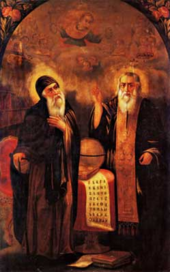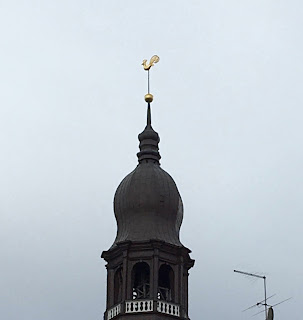THERE'S NO JULY 4TH CELEBRATION HERE
I'm sure it's unnecessary to say that there weren't any fireworks or celebrating here in Prague today. I will admit that we did have an Independence Day party with some other American friends for the 4th, but the rest of the city worked as usual.
However, they may have it better in the long run since they have two holidays in July -- the 5th and the 6th. Interestingly enough, instead of political holidays, both of the holidays have religious history behind them. On July 5th they celebrate St. Cyril and St. Methodius Day and the next day is Jan Hus Day. Since Czech Republic is known for it's atheism, we were surprised to find out that these days were national holidays.
Cyril and Methodius, brothers from Thessolonica in Greece, lived during the 800s. They were sent to Moravia as Byzantine Christian theologians to spread Christianity to the Slavs. Through their important missionary work in the area that is now the Czech Republic, they have received the title of "Apostles to the Slavs" bringing cultural development to the region. They are credited with helping in the development of the Cyrillic alphabet - thus its name. Their work with this new alphabet made it possible to transcribe the Bible into the language of the Slavic people. This language is used today in the area of Russia.
Because the brothers originally came from Constantinople, the Orthodox Church has long venerated Cyril and Methodius as saints with the title of "equal-to-Apostles". However, in 1880, the Roman Emperor added their feast day into the calendar of the Roman Catholic Church. Both church bodies today look to the brothers as heroes of the faith.
July 6th is also a national holiday in the remembrance of Jan Hus. On July 6, 1415, Jan Hus was burned to death as a heretic of the Roman Catholic Church. From his pulpit, Hus, a Bohemian priest in the Bethlehem Chapel in Prague, became a reformer of the corrupt Catholic Church. He wasn't afraid to criticise the Church for the use of indulgences and other immoral practices during the early 1400s.
He is especially known for his insistence on giving the members of his congregations both kinds (Jesus' body and blood) in the Sacrament of the Lord's Supper. The Church withheld the wine from communicants prior to this. His popularity increased as he became more well-known as rebellious preacher. By 1412, he was made an outlaw of the state when the Pope stepped in to quell his preaching.
In 1414, Hus was summoned to appear before the Roman Emperor and the Pope to explain his teachings. He was promised safe conduct to and from the meeting. However, on July 6th, this promise was broken when conference of leaders declared him a heretic and burned him at the stake.
The Hussites, followers of Jan Hus, rebelled against the rulers of their territory, starting the Hussite Wars, which pitted the people against the rulers of the Church. Jan Hus' importance, in the minds of the people of the Czech Republic, grew because they saw him as a peasant fighting for the people against the wealthy clergy, the good guy against the evil rulers.
After the overthrow of Communism in 1990, the Czech Parliament allowed July 6th to remain a national holiday - making the Hussites happy. To appease the Roman Catholics, they also declared September 28th - St. Wenceslas Day - a national holiday. And of course, they had to declare a national holiday for the Orthodox believers, so July 5th became St. Cyril and St. Methodius Day. Thus, three days off work to remember saints and martyrs in a country that has the most atheists in all of Europe.
Happy St. Cyril and Methodius Day! or Jan Hus Day! Take your pick.
Information from this post taken from "The Czech's in a Nutshell" by Terje B. England and Wikipedia-Saints-Cyril-and-Methodius
However, they may have it better in the long run since they have two holidays in July -- the 5th and the 6th. Interestingly enough, instead of political holidays, both of the holidays have religious history behind them. On July 5th they celebrate St. Cyril and St. Methodius Day and the next day is Jan Hus Day. Since Czech Republic is known for it's atheism, we were surprised to find out that these days were national holidays.
 |
| Cyril and Methodius - Public Domain |
Because the brothers originally came from Constantinople, the Orthodox Church has long venerated Cyril and Methodius as saints with the title of "equal-to-Apostles". However, in 1880, the Roman Emperor added their feast day into the calendar of the Roman Catholic Church. Both church bodies today look to the brothers as heroes of the faith.
 |
| Jan Hus - Public Domain |
He is especially known for his insistence on giving the members of his congregations both kinds (Jesus' body and blood) in the Sacrament of the Lord's Supper. The Church withheld the wine from communicants prior to this. His popularity increased as he became more well-known as rebellious preacher. By 1412, he was made an outlaw of the state when the Pope stepped in to quell his preaching.
In 1414, Hus was summoned to appear before the Roman Emperor and the Pope to explain his teachings. He was promised safe conduct to and from the meeting. However, on July 6th, this promise was broken when conference of leaders declared him a heretic and burned him at the stake.
The Hussites, followers of Jan Hus, rebelled against the rulers of their territory, starting the Hussite Wars, which pitted the people against the rulers of the Church. Jan Hus' importance, in the minds of the people of the Czech Republic, grew because they saw him as a peasant fighting for the people against the wealthy clergy, the good guy against the evil rulers.
After the overthrow of Communism in 1990, the Czech Parliament allowed July 6th to remain a national holiday - making the Hussites happy. To appease the Roman Catholics, they also declared September 28th - St. Wenceslas Day - a national holiday. And of course, they had to declare a national holiday for the Orthodox believers, so July 5th became St. Cyril and St. Methodius Day. Thus, three days off work to remember saints and martyrs in a country that has the most atheists in all of Europe.
Happy St. Cyril and Methodius Day! or Jan Hus Day! Take your pick.
Information from this post taken from "The Czech's in a Nutshell" by Terje B. England and Wikipedia-Saints-Cyril-and-Methodius



Comments
Post a Comment